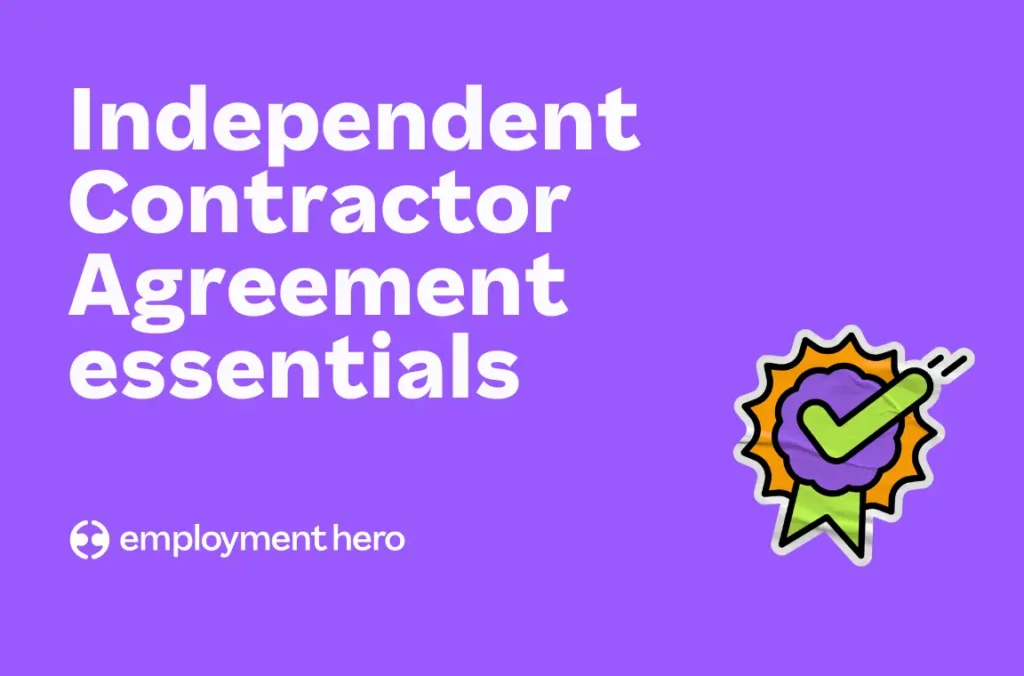Independent Contractor Agreement NZ: What to Include
Published
Independent Contractor Agreement NZ: What to Include
Published
When hiring independent contractors in New Zealand, a handshake or verbal agreement won’t cut it. Whether you’re outsourcing a one-off project or engaging a long-term contractor, having a written agreement is essential. Without one, you could be exposing your business to serious risks: tax errors, legal disputes or Employment Relations Authority claims.
This checklist walks you through what must be included in an employment agreement in NZ for contractors. It covers legal obligations, tax responsibilities and the key clauses that protect both your business and your contractor relationship.
Looking for a contractor agreement you can actually trust? Download our free checklist and take the guesswork out of compliance.
Disclaimer: The information in this checklist and its associated article is current as at 30 July 2025, and has been prepared by Employment Hero Pty Ltd (ABN 11 160 047 709) and its related bodies corporate (Employment Hero). The views expressed are general information only, are provided in good faith to assist employers and their employees, and should not be relied on as professional advice. The Information is based on data supplied by third parties. While such data is believed to be accurate, it has not been independently verified and no warranties are given that it is complete, accurate, up to date or fit for the purpose for which it is required. Employment Hero does not accept responsibility for any inaccuracy in such data and is not liable for any loss or damages arising either directly or indirectly as a result of reliance on, use of or inability to use any information provided in this article. You should undertake your own research and seek professional advice before making any decisions or relying on the information in this checklist and associated article.

What is an independent contractor agreement?
An independent contractor agreement is a written contract that outlines the relationship between a business and a self-employed contractor. It sets expectations, defines deliverables and protects both parties under New Zealand law.
Unlike employees, contractors manage their own tax, provide their own tools and operate independently. But it’s not enough to simply label someone a “contractor”. How the relationship works in practice matters.
Contractor vs employee: key legal tests
In New Zealand, employment classification is guided by four key principles:
- Intention: What did both parties agree to?
- Control: Who decides how, when and where the work is done?
- Integration: Is the contractor embedded in the business?
- Economic reality: Is the contractor running their own business?
Misclassification can be costly. If in doubt, get legal advice to help assess the working relationship and advise on the right classification.
Health and safety obligations under NZ law
Under New Zealand legislation, contractors are considered “workers”. That means your business has a duty to ensure their health and safety, just as you would with employees.
Use your agreement to clarify responsibilities, especially if contractors will be on-site or using business-owned equipment.
Tax, ACC and KiwiSaver obligations
Independent contractors are responsible for their own:
- Income tax (including provisional tax)
- ACC levies
- GST registration (if earning over $60,000 per year)
- KiwiSaver contributions (optional opt-in)
While most contractors handle their own taxes, there are exceptions. If you’re unsure about tax obligations, our HR Advisory service can help clarify them.
Essential clauses for NZ contractor agreements
A strong contractor agreement should always cover the following:
Scope, deliverables and payment terms
Define the project, timelines, milestones and how invoices will be handled.
Intellectual property and confidentiality
Clarify who owns the work produced and what information must be kept confidential.
Restraint of trade and non-solicitation
Protect your business from contractors poaching clients, staff or intellectual property after the contract ends.
Termination, indemnity and liability
Include a termination clause and define responsibilities if something goes wrong.
Dispute resolution clause
Set out how conflicts will be resolved before they escalate into legal action.
Regulatory and compliance considerations
Contractor agreements must comply with New Zealand’s commercial and consumer legislation, including fair contract terms and recordkeeping obligations. For smaller contracts, unfair terms may still be challenged in court.
Recordkeeping and document retention
You should keep signed agreements, tax records and invoices for at least seven years. Accurate records are critical if your contractor relationship is ever reviewed.
Negotiation and signing best practices
Avoid copy-paste contracts. Tailor your agreement to the actual arrangement, allow time for negotiation and ensure both parties sign with full understanding.
For more complex arrangements, such as cross-border contractors or IP-heavy projects, seek professional guidance.
Avoiding misclassification risks and penalties
Misclassifying an employee as a contractor can trigger:
- Backdated tax and leave obligations
- ACC adjustments
Employment Relations Authority disputes - Penalties and interest from regulators
FAQs on Independent Contractor Agreements NZ
Yes, but they must opt in voluntarily. Contributions are not automatic.
Only if it’s reasonable in scope and duration, and tailored to the arrangement.
Yes, if their income exceeds $60,000 in any 12-month period.
Only if your agreement allows it. Include a clear termination clause.
Contractors pay their own levies. Businesses do not contribute unless the contractor is misclassified.
That depends on the role. Common options include public liability and professional indemnity.
Yes. Independent contractors can take on other work unless your agreement says otherwise.
Yes, but it’s harder to enforce. Written contracts are always recommended.
No. Contractors are not entitled to leave or other employee entitlements.
Usually no, unless they fall under a special withholding category.
Yes, but they must be agreed in writing. They are not mandatory.
You could face legal and financial penalties. Make sure your agreements reflect the true nature of the relationship.
Register for the checklist
Related Resources
-
 Read more: Contractor or employee? The proposed gateway test
Read more: Contractor or employee? The proposed gateway testContractor or employee? The proposed gateway test
A new gateway test could help businesses who are engaging contractors.
-
![Independent contractor rights in New Zealand [Factsheet]](https://employmenthero.com/nz/wp-content/uploads/sites/5/2021/09/Independent-Contractors-NZ-Factsheet_626x870.png) Read more: Independent contractor rights in New Zealand [Factsheet]
Read more: Independent contractor rights in New Zealand [Factsheet]Independent contractor rights in New Zealand [Factsheet]
Distinguish between employees and contractors to ensure compliance with this factsheet.





















